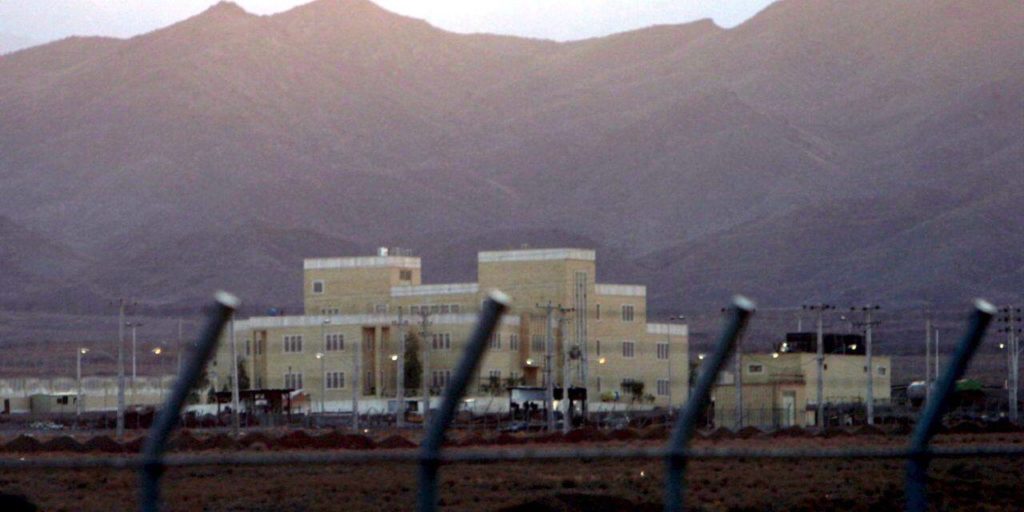The Iranian government announced on January 4 that it had resumed enriching uranium to 20 percent at its underground nuclear facility at Fordow, in a significant move that can shorten Iran's "break-out time" - the time it would take to develop a nuclear bomb.
A few days later, on January 20, Joe Biden starts its presidency intent to engage Iran and reach a new nuclear deal. While the American negotiating strategy with Iran is not clear yet, its chances of achieving a deal that could allay Israeli fears of a nuclear Iran are slim. The developments in Tehran and in Washington make an Israeli preemptive strike on Iran's nuclear installations more probable.
Israeli fears of Iran are result of Iran’s drive for Middle East hegemony and its quest for a nuclear bomb. The religious leadership of the Islamic Republic of Iran believes that the Jewish state has no right to exist and that Israel will either wither away under military pressure or be annihilated when it is weak and vulnerable. Iran's theological hostility reinforces Israel’s perception of an existential threat from Iran.
Iran’s proxies
The sophisticated leadership in Iran has capitalized upon the weakness of Arab states to threaten Israel from Lebanon, Syria, Iraq, and Gaza, by funding and training Iranian-supported proxies. Iran was even successful in arming the distant Houthis in Yemen with long-range missiles aimed at Israel. Shi’ite militias in Iraq and Syria also threaten the Hashemite Kingdom. The fall of Jordan would complement Iran’s attempt to encircle Israel.
Encircling Israel with proxies possessing a myriad of missiles against Israel's populations centers and strategic installations – a "ring of fire" - is a necessary condition for weakening the Jewish state, neutralizing its strategic superiority and attaining regional hegemony.
The international community largely ignored Iran's regional behavior. Iran benefited from American Middle East policy. The US undermined the balance of power in the Gulf, strengthening Iran. It destroyed Saddam Hussein's regime, without being able to establish a strong successor government.
Moreover, President Donald Trump's decision to withdraw American troops from northeast Syria in the spring of 2019 signaled American intentions to leave the Middle East and improved Iran’s chances to erect a “Shiite corridor” from Iran via Iraq and Syria to the Mediterranean Sea.
In the absence of a credible American security umbrella, most Sunni Arab states have been terrified by the advances in the Iranian nuclear program and by the successes of its proxies. This high threat perception produced an entente with Israel that was perceived to be the only power able and willing to stop Iran. Iran also realized that Israel is the main military barrier to its hegemonial aspirations. Thereby, Israel has become for Iran a strategic, as well as a religious anathema.
Iran’s nuclear project
Although the Iranian nuclear project is primarily intended to deter an invasion and to assure regime survival, it elicited many fears in the region. Indeed, Iran's nuclear program coupled with long-range delivery systems, indigenously produced, threatens all Middle East states and beyond. Moreover, it breaks Israel's nuclear monopoly in the region, giving Iran a better chance to achieve hegemony.
A nuclear-armed Iran would generate nuclear proliferation in the immediate region. Middle Eastern states, who invariably display high threat perceptions, are unlikely to look nonchalantly on a nuclear Iran. American extended deterrence, particularly these days, is not credible in the Middle East, reinforcing the current attempts to counter Iranian influence by adopting similar nuclear postures.
Israel views a multi-polar nuclear Middle East with trepidation. Achieving stable deterrence with one hostile nuclear armed Middle Eastern state is extremely doubtful. With more than one it is a nightmare. Israel feels vulnerable to a nuclear attack due to its small territory, only a short distance away from its foes. The likelihood of accidents, unauthorized launchings, miscalculations, or regime collapse in the region is much higher than in other parts of the world. The period before the establishment of credible second-strike capabilities and safeguards is particularly dangerous.
Significantly, securing a second-strike posture is an ongoing process fraught with uncertainties. Furthermore, deterrence is dependent upon sensitivity to cost. Religious fanaticism, widespread in the Middle East, is reducing sensitivity to cost. Indeed, Iranian leaders have expressed a willingness to lose millions of people in order to eradicate the Jewish state. They boast about their culture of Jihad and martyrdom. The belief in the stabilizing effects of nuclear proliferation is wishful thinking on part of irresponsible arm-chair strategists.
Low-profile war
Israel opposes Iranian encroachment and nuclearization. Therefore, Israel has begun a low-profile limited war (the "campaign between wars") to hinder Iranian attempts to transform Syria and Iraq into missile launching pads, and a safe route for the shipments of missiles to Hezbollah and components aimed at improving their accuracy.
In parallel, Israel continued with covert obstruction of Iran's nuclear program as the June 2020 explosion at Natanz and the elimination of the top nuclear scientist Mohsen Fakhrizadeh in November 2020 seem to indicate.
When these tools are no longer deemed effective, surgical air strikes are employed to destroy the nuclear installations in neighboring countries. In 1981, the Iraqi Osiraq reactor was demolished. A similar fate awaited the Syrian reactor in 2007. Preemption of an emerging threat is an integral part in Israeli strategic thinking.
Preemption has become a more probable option. Iran removed limitations on uranium enrichment, shortening the breakout time. Indeed, the Israeli intelligence has released an estimate in October 2020 that Iran will have enough material for a nuclear bomb within the year. Taking into consideration Iranian duplicity in its nuclear behavior, breakout time could be shorter.
Unfortunately, diplomacy and economic sanctions has thus far had only a limited effect on Iran's nuclear project. Whatever efforts at “regime change” were made were unsuccessful, raising the military option. Washington seems to shy away from a military confrontation.
Existential threats
If left alone and after realizing that covert means have exhausted their usefulness, Jerusalem would seriously consider taking military action, particularly when its threat perception is increasing. A people with a long history of persecutions, and a Holocaust is unlikely to ignore threats of extinction.
Iran's nuclear aspirations are seen in Israel as an existential threat, lending domestic legitimacy for military action against Iran. Despite the many obstacles to a successful mission, the Israel Defense Forces (IDF) seems capable of executing it. Prime Minister Netanyahu consistently and emphatically reiterates that Israel will not allow Iran to become a nuclear power.
An indication of the Israeli mood is the resolute speech given by the IDF Chief of Staff, Lt. Gen. Aviv Kochavi, on December 25, 2019. He singled out Iran and its proxies as the main threat against Israel, adding that the military has been preparing for an almost inevitable Israel-Iran collision.
Kochavi also hinted at the inaction of the Gulf states and the United States in the face of Iranian strikes on oil installations and ships. “It would be better if we weren’t alone,” he remarked. Kochavi also established a new directorate to be headed by a Major General to contend with the Iranian threat.
Israel might strike also to preempt the return of Iran to the negotiating table. Iran may revert to a strategy of "talk and build" to buy time, capitalizing on Western reluctance to escalate. Essentially, inconclusive talks preserve a status quo, in which Iran can go on with its nuclear program. Indeed, bargaining, at which Iranians excel, and temporary concessions postpone diplomatic and economic pressures and most importantly preventive military strikes.
Israel might strike earlier rather than later in order to prevent additional improvements in Iran’s defensive measures around its nuclear installations. For example, Russia supplied Iran with an S-300 air defense system in 2016 (after the JCPOA was signed), while the more advanced S-400 system remains on the Iranian shopping list.
New deal or preemptive strike
Israel may also preempt to prevent bandwagoning in the Gulf. As Iran becomes more powerful in the region and the US security umbrella becomes less reliable, reorienting the foreign policy towards Tehran might become more attractive for the Gulf states. Such rapprochement with Iran might then affect Jordan and Egypt (which both have peace treaties with Israel), further isolating Israel in the region. An Israeli show of force will therefore keep the Sunni states aligned with Israel.
Israel hardly shares the widespread apprehension about the regional repercussions of Israeli preventive actions. Preemption in Iraq and Syria ended the nuclear projects in these states with only marginal international costs.
An Iranian nuclear arsenal constitutes an insurance for regime survival and is important for achieving regional hegemony. Thus, it is inconceivable that the mullahs will give up the quest for the bomb, unless forced to do so. The fact that only hardliners run for the June 2021 presidential elections hardly favors the emergence of a reasonable Iranian negotiating position versus the Biden administration. Regime change remains unlikely in the near future. The international community, including the US, has no appetite for military confrontation with Iran.
In contrast, Israel feels extremely threatened, leaving it little choice but to act upon its existential instincts. For a while, it will probably allow Biden a chance to renegotiate the nuclear deal and meet Israel's minimum conditions for a good agreement. In order to reverse Iran's ascendance in the Middle East, prevent its nuclearization and thwart Israel's encirclement by Iranian proxies, preemption will remain on the table.
By Professor Efraim Inbar


